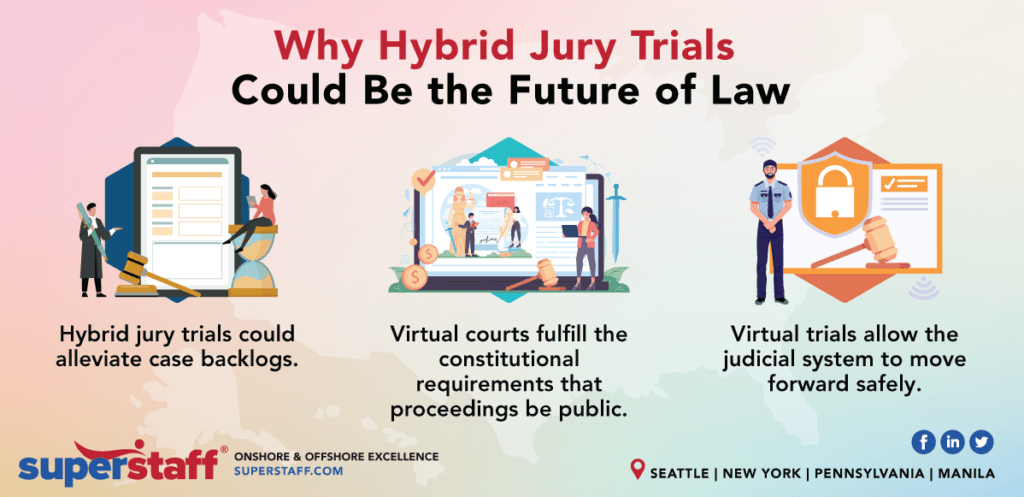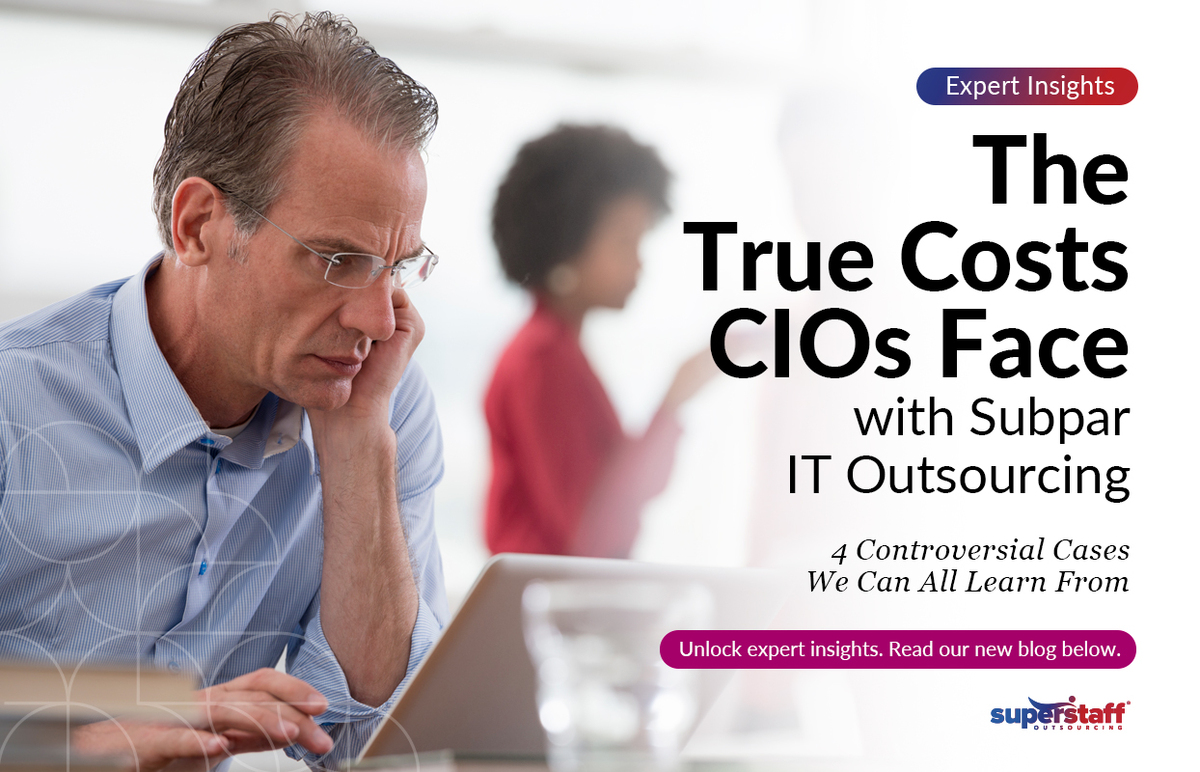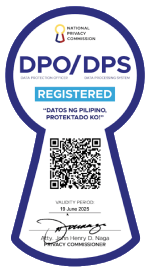
In response to the health risk brought by COVID-19, lawmakers signed the CARES Act or Coronavirus Aid, Relief, and Economic Security Act into law in 2020. Among the crucial provisions of the act is a clause authorizing particular federal criminal and civil proceedings to be held remotely via video or teleconferencing.
As uncertainties force U.S. courts to experiment with new ways to uphold justice, could hybrid jury trials and virtual paralegal services be the future of law? Let’s weigh in.
How Hybrid Jury Trials Take Place
A hybrid jury trial incorporates in-person and digital interactions in the same proceeding.
While courts generally observe the established rules of court etiquette in virtual or hybrid trials, how the hearings occur may vary. Each court and the judicial officer can develop their procedures and guidelines as long as they do not violate a party’s constitutional rights. Take Mohave County, for example.
The court conducts indictment by giving the grand jury members the option to participate in person or remotely via Zoom. At the same time, the foreperson in charge of document signing attends proceedings in person. In different instances, the county has heard cases where half of the jury members attended virtually and half in person.
Courts may also make full use of the technological features of the platform, such as breakout rooms and mute buttons, to ensure proper decorum and impartiality.
As the proceedings are considered public records, they are recorded by the court.
A verbatim transcript, either generated by Zoom or transcribed by a legal support service provider, is also produced. Additionally, the public and the press are given access to eligible hearings via live streaming or uploading the recording to the court’s website.
Read More: 5 Law Industry Trends in 2021 and How Legal Process Outsourcing Pushes Firms Forward
Why Hybrid Jury Trials Could Be the Future of Law (And Why You Need To Outsource Paralegal Services)
#1: Hybrid jury trials could alleviate case backlogs.
Since the pandemic, many courts across the country have faced severe understaffing. As a result, the backlogs of cases awaiting trials have ballooned. Take a look at the following data:
- US immigration courts have an overwhelming backlog of 1.6 million cases.
- In Maine, the backlog has swelled by 45% above pre-pandemic levels.
- In San Francisco, almost a quarter of trials are overdue.
- Texas has a backlog of court trials that could last up to 5 years.
Hybrid trials and arbitrations have helped dramatically alleviate backlogs and give defendants their rightful day in court. This is because, naturally, virtual processes get things done faster. Virtual hearings have afforded more people access to court hearings and other proceedings.
With technology allowing instant switching to one virtual courtroom after another, lawyers can attend multiple proceedings daily. Time spent on lengthy commutes is used to move cases forward. The same benefit applies to the court justices, juries, litigators, paralegals, witnesses, and court employees.
The pace of hybrid jury trials also moves faster than the arcane in-court proceedings embellished with theatrical attributes and rituals. These are minimized in remote trials. Since functionalities of Zoom and other video conferencing platforms cannot capture a full-dimensional view of the participants or recreate a court atmosphere, many archaic procedures were skipped.
As a result, trials move faster since participants get to spend more time and focus on facts and laws. Since aggressively pursuing online trials, Texas alone had conducted 1.1 million remote proceedings.
#2: Virtual courts fulfill the constitutional requirements that proceedings be public.
Hybrid jury trials not only make upholding the justice system convenient. They also help make it more transparent. Virtual hearings meet the requirements of the First and Sixth Amendments, two constitutional provisions that guarantee the public’s participation in trials.
The Sixth Amendment protects the right of criminal case defendants to an undelayed, impartial, and public trial. It allows spectators to witness the proceedings so that prosecutors, defendants, and jurors will be forced to take accountability for their actions, helping the dependants achieve transparent and fair procedures.
On the other hand, the First Amendment enables the public and the press access to criminal trials. It allows the said sectors to scrutinize the process to ensure fairness and the integrity of the proceedings. Although the right to access a trial is not absolute, most cases are open to all. However, natural barriers, such as travel distance to the court, can make viewing in-person trials impractical for many.
Virtual hearings have made exercising constitutionally amended rights easier for many.
Through live streaming, public hearings are no longer confined to physical courtrooms or a specific timeframe. People can watch proceedings asynchronously by accessing the court’s YouTube channel, website, or other platforms.
#3: Virtual trials allow the judicial system to move forward safely.
After dropping steeply since peaking in January, the COVID cases in the U.S. have started to increase again. As of writing, the total number of cases is 80.7 million, with a daily average of 43,357 cases.
Virtual jury trials allow the judicial system to continue in these uncertain times. It helps ensure that involved parties get their days in court while promoting the safety of court employees and everyone involved in the proceedings.
Zoom court does not only promote physical safety but (arguably) also psychological safety. In-person, a courtroom atmosphere and dynamics can be intimidating and stressful, even for seasoned lawyers. In an American Bar Association Journal article, Chief Justice Bridget Mary McCormack of the Michigan Supreme Court said that the court is less intimidating on-screen. She added:
“When you are in the comfort of your own home, where you feel safe and secure, it’s easier to feel confident in letting the court know what’s on your mind. Also, everybody’s Zoom boxes are kind of the same size. There’s something equalizing about that.”
Additionally, it is easier to de-escalate tensions in virtual hearings. Cases that are often tense, such as divorce proceedings, can benefit from the “more relaxed atmosphere” virtual trials create.

The Problems With Hybrid Jury Trials
Virtual or hybrid jury trials can be a double-edged sword for attorneys. One significant upside for law practitioners is that it offers a platform to showcase one’s expertise to a broader audience. However, remote proceedings also have downsides.
-
Hybrid trials put tons of pressure on lawyers.
Social media and video streaming channels put one under the microscope. We all know how scrutinizing—and even unforgiving—netizens can be, relentlessly pointing out every mistake or inconsistency. Whether as a prosecutor or a defendant, you have to come into every virtual trial wholly prepared to be at your very best the entire time.
-
Remote proceedings cannot fully capture emotions.
The lack of capacity for video conferencing to showcase the multidimensional views of the attendees is also one of the significant downsides of virtual trials. Zoom cannot fully capture one’s facial reactions and body language that jurors use to read the authenticity of one’s emotions.
-
The platform is prone to distractions.
Videoconferencing is prone to various distractions brought by the participants’ environment. From noisy neighbors and pets to technical and connectivity issues, all these can impact a lawyer’s performance and the jury’s perception.
Let the Evidence Speak for Itself: How Virtual Paralegals Can Help
Preparation is crucial to compensate for the downsides of virtual or hybrid jury trials. Law practitioners must support their cases with compelling research and documentary evidence to make a strong point. This makes the support of virtual paralegals and other legal process outsourcing services even more necessary.
Paralegal services are crucial to keeping up with the fast-paced virtual trials. Even with in-person trials, performing due diligence can take a lot of a lawyer’s time—that is best used coming up with the best strategies and building relationships with clients.
Benefits of Outsourcing Paralegal and Other Legal Support Services
Paralegals afford lawyers similar benefits that surgical nurses offer surgeons. By preparing everything ahead of time and being on alert standby during the actual surgery, nurses enable surgeons to give laser-focus attention to the patient.
Paralegal service providers perform a wide range of legal support services that enable lawyers to entirely focus during trials. Before the proceeding, paralegals meticulously ensure that attorneys have all the documents and information they need by:
- Interviewing and coordinating with clients and witnesses
- Conducting witness, document, data, and legal research
- Drafting legal documents, such as depositions and testimonies
- Uploading exhibits and pertinent records in the trial software
During the actual trial, paralegal service providers assist clients. They also help ensure lawyers perform efficiently by:
- Ensuring that pertinent documents are complete before the trial starts
- Handling courtroom exhibits
- Lining witnesses for testimonies
- Anticipating the needs of the lawyers and witnesses
Read More: 5 Ways Virtual Legal Assistants Help Law Firms Boost Satisfying Client Experience
Outsource Legal Services With SuperStaff
Whether the trial is virtual or in-person, reliability and trustworthiness are two essential traits of a paralegal service provider. SuperStaff ensures that these qualities are upheld as we provide our clients with a comprehensive range of legal process outsourcing solutions.
With locations in prime business districts and near top educational centers in the Philippines and the U.S., we bring you closer to top-caliber paralegals and other professionals providing exceptional service legal support.
Schedule a consultation with us to learn more.





